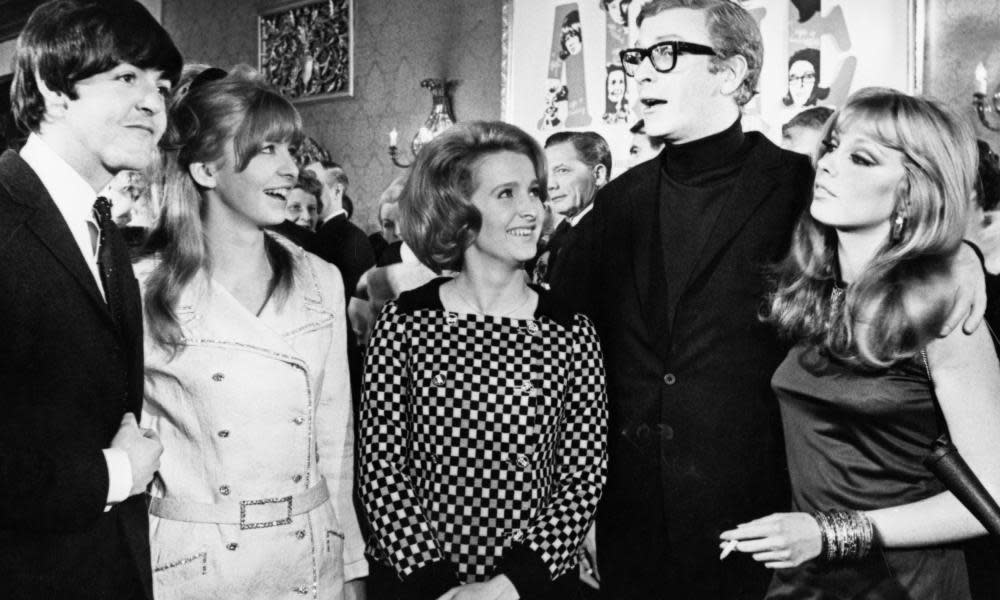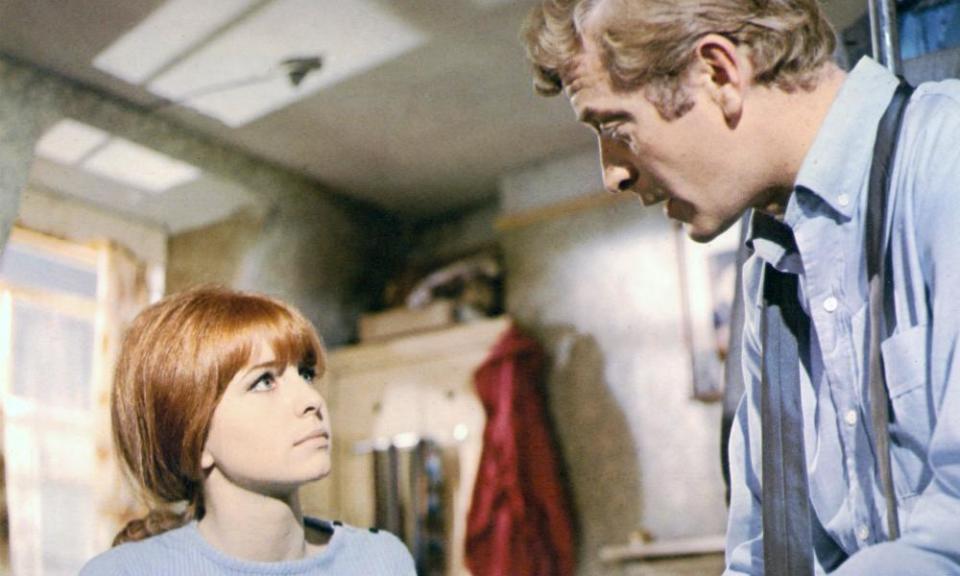Michael Caine on how the 1960s broke class barriers: ‘I’ve met lots of equals. No betters’

As a schoolboy, Michael Caine, the son of a charlady and a fish-market porter, was repeatedly taught to respect “his betters”. It took the social revolution of the 1960s, he says, to make it clear that such a hierarchy did not exist. “I’ve met lots of my equals since. But no betters,” Caine told the Observer this weekend on the eve of the British premiere of his documentary about the outpouring of working-class creativity in the 1960s.
“True, there was a lot of new music and great actors, as well as books and film directors and some dancing in discos, but it was a lot more than that: it was a change in the social lives of young people,” he said.
My Generation, which Caine presents, is screened on Sunday at the London film festival and tells the story of the cultural upheaval of the era of the “swinging 60s” through rare archive footage and interviews with his fellow stars Paul McCartney, Twiggy, Marianne Faithfull, David Bailey, Roger Daltrey and Mary Quant. All are survivors of an age of damaging excess as well as veterans of a great artistic boom.
Caine says his chief motivation for making the film, which he co-produced, was showing modern audiences how post-second world war Britain began to offer a route to the top for the young, educated lower classes.
“There was a lot of snobbery then. It was terrible. There is a lot now too, but it can’t really hurt anyone because we don’t give a toss any more,” he said.
Following Caine’s career, the documentary charts the rapid pace of change, particularly in London. The actor now attributes the huge social shift to the influence of grammar schools, offering “a posh education for free”, and to a national hunger for fun and colour after the war years.
“We were born in the depression and then the second world war came along. So there was six years of waiting each day to see if we got a telegram saying our dad was dead. Then I was sent to Korea as a teenager, holding the 38th parallel, and on to Berlin during the allied occupation.
There was a lot of snobbery then. There is a lot now too, but it can’t hurt anyone because we don’t give a toss any more
“After all that of course we thought, ‘Let’s have a good time’. At first though, we didn’t have anywhere to go. We could go to the eel pie shop, but we couldn’t go to a restaurant because you had to have a suit and tie, and most of us couldn’t afford that. And you had to be 18 to get into pub. No one organised the 1960s, but this is why it happened.”
Born Maurice Micklewhite in south London, Caine changed his name for the actors’ union Equity, picking the surname Caine when he saw a sign for the Humphrey Bogart film The Caine Mutiny. “I decided to be an actor because I thought it would be a lot better than working in a factory, which I was doing at the time. I just set out to do it and I never expected any money or any fame.”
Caine, now 84, thinks working-class writers led the way. And it was theatre that counted first for him. “When it changed it was all down to the writers. They started writing for working-class people and it made all the difference. Playwrights like Noël Coward, someone I later knew very well, wrote middle-class parts for the stage. If you had a cockney accent you were going to play the butler. But John Osborne wrote Look Back in Anger in 1956 and that, I believe, was the first major piece of theatre that had a working-class hero.”

Another landmark was the play The Long and the Short and the Tall, in which Caine appeared with Peter O’Toole: “I was the understudy, but that was the first play told from a British private’s viewpoint, rather than an officer’s. There were American films about lower ranks, but British films and plays were all about officers and the like.”
As McCartney puts it to Caine in the documentary: “Suddenly people realised the working class wasn’t as thick as it looked and it had talent.”
“It really did begin with the writers,” Caine added this weekend. “My actor friend from East London, David Baron, told me one day he had written something under his real name that was going on at the Royal Court and he wanted me to be in it. I thought it was probably bullshit. But then I was in it and it was The Room; Harold Pinter’s first play.”
Yet snobbery remained widespread, Caine argues. His breakthrough screen role in the 1964 film Zulu would not have been offered to him if the director had been English, he believes. Caine was originally up to play a corporal but the American director Cy Endfield felt he had officer potential and asked if he could “do a posh accent”. Caine’s repertory theatre experience made this a cinch and he largely attributes his subsequent success to his years on the stage, learning a skill that transferred to screen.
“I played everybody. It is invaluable for a young actor, whether you are going to be in movies or not. The ones that mumble now are the ones with little or no theatre on their CV. It is not about shouting; it is just about enunciating. And if you think in terms of memory alone, I was doing two hours of dialogue a night while learning the next part during the daytime. These days an actor on a film sometimes just has two lines to say and some still have trouble.”

He regards winning a major role which left his cockney accent intact as the biggest achievement of his early career: “Alfie was a womaniser and a cockney and it was a big lead part. That was important.”
But he looks in vain, he says, for new working-class stars. “I can’t see many of them so far.” His advice to a contemporary Maurice Micklewhite would be to look for assistant stage manager work at a provincial theatre. “There are a few places where it’s still possible, I hope,” he said, remembering his own time working with Joan Littlewood’s socialist theatre collective. “I was an imposter there really,” he admits.
Film, however, remains his great love. “As boys my friends and I did not go to the theatre. It was the cinema that was there for us and so that was what I wanted to do.” He has now appeared in a record 70 British films over a 60-year career, according to the British Film Institute, and made 130 in total.
The British industry is enjoying another boom now, Caine believes: “The units and the studios here are the best,” he said. Certainly the British appetite for cinema is at a new peak, with audience spending on tickets this year crossing the £1billion mark in record time last week.The 1960s also had its casualties. Caine avoided addiction to drink and steered clear of drugs, while watching the impact on many of his friends. “It was drugs that brought the 1960s to an end,” he said. “Drink alone did it for others, of course, and a lot of alcoholic actors died that way. They were not famous people. They were friends of mine and it is a sadness to me that they drank themselves to death just through a lack of work or something.”

 Yahoo Movies
Yahoo Movies 
